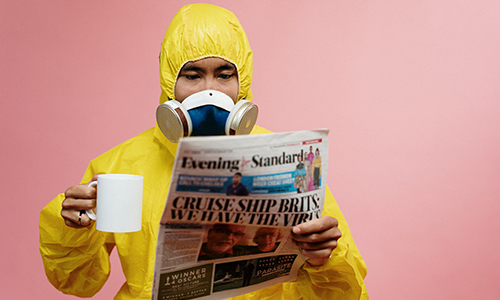- About
- Programs
- Resources
- For AFT Higher Ed Members
- Academic Freedom
- Shared Governance
- Political Interference in Higher Ed
- Racial Justice
- Diversity in Higher Ed
- Responding to Financial Crisis
- Privatization and OPMs
- COVID-19 Pandemic
- Contingent Faculty Positions
- Tenure
- Workplace Issues
- Gender and Sexuality in Higher Ed
- Targeted Harassment
- Intellectual Property & Copyright
- Free Speech on Campus
- Civility
- Publications
- Data
- News
- Membership
- Chapters
Faculty Forum: Apprehensions, Comprehensions, SARS-CoV-2
Conspiracy theory versus scientific method in a world gone viral.

“‘Although beginnings count, in this life we end up with what we settle for.’ Interpret this sentence. You may agree or disagree with it. Apply your understanding of its rightness or wrongness to your own life experiences—any aspect of those experiences. Be specific and detailed.”
I have long used that prompt for the final in-class writing assignment in my upper-division writing class, because it combines the personal and the argumentative essay. The essays it has prompted have gone in many directions, but usually they have fallen into either the “overcoming adversity” or the “confronting grim reality” categories.
I didn’t teach that particular writing class last spring. I was busy learning that when you teach from home you never go home from teaching. Still, I wonder how my composition students might have responded to that prompt in the midst of the global pandemic. Given that the course in which I used the prompt was also a class in critical thinking, how might they have responded to the competing and increasingly politicized narratives of scientific method versus conspiracy theory surrounding the pandemic’s origins?
When we say that an idea has “gone viral” we are already pointing in the direction of an eventual epidemiology of epistemologies—identifying, tracking, and combating the spread of error in human systems of knowing. From such an analytical perspective, scientific method may be said to value accuracy over certainty, while conspiracy theory values certainty over accuracy.
Usually this is not a problem, as our understanding of specific objects of knowledge generally becomes more certain as the measurement of them gets more accurate. After a particular Heisenbergian point, however, accuracy and certainty prove to be inversely proportional. The more accurate, the less certain. The more certain, the less accurate. Beyond that horizon, accuracy demands that what one believes must conform to what is, while certainty demands that what is must conform to what one believes.
In these uncertain times we constantly hear the phrase “in these uncertain times.” In their pursuit of a comforting certainty, those who promote or believe in conspiracy theories can readily be accused of being intellectually lazy or guilty of a rush to closure. Yet conspiracy theories appeal to so many people precisely because they cater to our desire for story. Someone—mythical microbe designers in a Level 4 biocontainment facility in Wuhan, Big Government, Big Pharma—has to play the villain.
There are no true accidents in conspiracy theories. No room for chance, no room for uncertainty—just the con artist’s proverbial “sure thing.” In many ways conspiracy theorists and con artists are two sides of the same counterfeit coin: the former are pushing a false history of the past, the latter a false hope for the future.
Science, in contrast, allows for uncertainty, for chance. It allows for the increasingly proven possibility, say, that pandemics can arise at the interface of natural virus reservoirs and a hyperconnected, hyperconsuming, and hyperdense global humanity that has increasingly moved into close proximity to wild lands and wild animals.
But what kind of story does that make? If everyone’s to blame, is no one to blame? This is a clash of ignorant armies existing on vastly different scales, foretold for decades: viruses, the most numerous microbe on the planet, versus humans, the most powerful macrobe. If, in the current politicized atmosphere, science has become for some the setup for a joke with no need for a punch line and conspiracy theory has become for others a punch line with no need for the setup of a joke, then who’s laughing? Who’s telling the joke? Is it funny?
Beyond all the talk of cabin fever and reopening the economy, I realize that (in addition to the ubiquitous personal risk-benefit analyses all of us seem to be performing) something deeper is going on. To live in constant fear of dying is also to die in constant fear of living. I get that—but I still don’t want to get COVID-19. As someone over sixty with decades of asthma in my past, neither of my likely prospects—living a deathly life or dying a lively death—looks all that promising.
Both beginnings and ends, setups and punch lines, count. Who is overcoming adversity here? Who is confronting grim reality? Can anyone really do either without also doing the other?
Howard V. Hendrix has taught literature and writing at California State University, Fresno, for many years. Academe accepts submissions to this column. Write to [email protected] for guidelines. The opinions expressed in Faculty Forum are those of the author and do not necessarily represent the policies of the AAUP.


